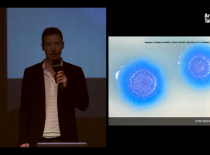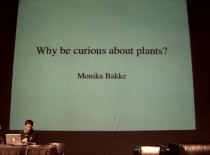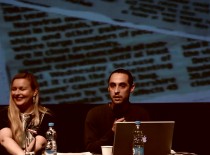Prague - April 6, 2013
Nina Czegledy talks on workshops, conference panels and publications on The Extension of Man within Catch Forum 2013 at 6th International art - sci - tech biennale Enter 6: Biopolis in Prague, Czech Republic.
Over the last year and half, I have initiated an ongoing series of workshops, conference panels and publications on The Extension of Man – Hacking the Body – Prosthetics theme at the University of Toronto, Concordia University, Montreal, Caldas University, Manizales and the “Illuminate” international Congress in Toronto – with the intent to expand knowledge on what a prosthetic is and what is possible exploring concepts and theory related to the socio-technical, ethical, and cultural issues related to prosthetics.
The term prosthetics indicates an addition or extension. The word “prosthetics” was included in medical terminology in the 16th Century. Three centuries later, Marshall McLuhan wrote in his seminal book Understanding Media: The Extensions of Man first published in 1964: Today, when we have extended all parts of our bodies and senses by technology we are haunted by the need for an outer consensus of technology and experience that would raise our communal lives to the level of a world-wide consensus. McLuhan also argued that ‘any medium whatever is an extension, a projection in space or in time, of our various senses. He postulated that while earlier technologies extended one part of the body (for instance the wheel extending the foot), the new electronic technologies extended the whole nervous system.
In an increasingly technologically mediated world the issue of what constitutes a prosthetics becomes crucial. It is important to note the evolving trans-disciplinary role of the artist in the design process and techniques, the process of innovation, scientific visualization and the process of developing and disseminating a prosthetic. The question remains: If designers, scientists and engineers are limited by a focus on restoring function, how can those who rely on prostheses benefit from advances in artificial intelligence, materials science, nanotechnology and other emerging discoveries? Rapidly emerging engineering technology and advanced materials have revolutionized prosthetics developments over the last decades. The most advanced apparatus can respond to instructions from the central nervous system, therefore these neural controlled devices are anticipated to forecast the future progress of prosthetics.
The presentation will briefly examine some of the issues related to prosthetics, such as history, material developments, ethical concerns, biological and evolutionary aspects, sports related issues and approaches by artists.
- Tags:





 Copyright © 2025 ARTISTTALK. All Rights Reserved.
Copyright © 2025 ARTISTTALK. All Rights Reserved.
0 Comments
You can be the first one to leave a comment.